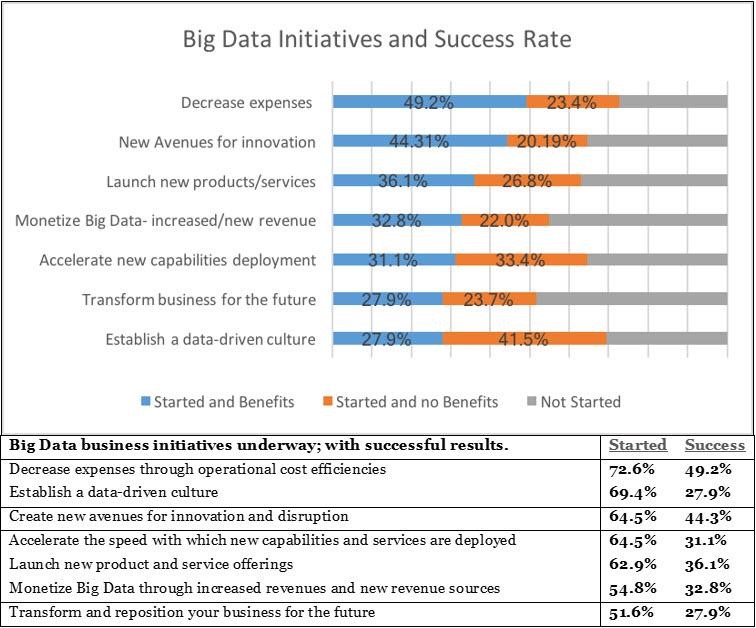January 21, 2019 | Written by: Sneha Mary Christall
Tags: Big Data, Big Data Analytics
Share this post
In recent years, the narrative around business intelligence has seen an ocean of change. At the forefront of this change has been the growing demand for data-driven business insights. It comes as no surprise that Big Data Analytics is changing the way businesses operate. It has helped combat the explosion of information by not just tackling business challenges, but by contributing towards improved business functioning.
A recent study by NewVantage Venture Partners has discovered that Big Data delivers most value to enterprises by decreasing expenses (49.2%) and creating new avenues for innovation and disruption (44.3%).

Here are 5 reasons why Big Data Analytics, powered by AI and IoT technologies is the future of enterprise:
With the help of Big Data Analytics, Walmart recently automated their business decisions. With about 245 million customers visiting 11,200 stores all over the world, they gathered 2.5 petabytes (1015) of unstructured data from one million customers every single hour. This data was used to analyze what customers were buying, what factors affected their buying choices and so on.
Using AI systems that processed the Big Data, they made automated business decisions such as:
- How many units of stock of each of their products were to be placed in each store
- Automated orders with suppliers depending on the demand data.
KnowledgeLens’ flagship product GLens provides a real-time monitoring and analytics platform for pollution control. By combining real-time data acquisition, monitoring and analytics, industrial enterprises can keep tabs on their emission levels, effluent discharges and air quality index.
What’s more, it also has the capability to support weather forecasting models based on measured parameters. With real-time alerts and and interactive dashboards that capture data, this tool becomes crucial for emergency planning and disaster mitigation, with the potential to save actual human lives.
Big Data Analytics enables enterprises to pool people into groups, based on their buying patterns and history, thus reducing search costs, and enabling faster delivery. From a technical standpoint, enterprises can now achieve “perfect discrimination” and maximize producer surplus. With the data gathered and analyzed by way of Big Data tools such as Hadoop and Spark, customers are presented with Customized Product Recommendations and New Product Suggestions, providing them with a happy, hassle-free buying experience.
On the other end of the spectrum, retailers stand to gain as well, by adopting Big Data Analytics for their Sales/ Marketing operations. With KnowledgeLens’ AI-powered enterprise software, AiLens, retailers can use its built-in Machine Learning algorithms to calculate the sales and margins for each retail promotion. By automating the assessment of each of their promotions, they can allocate their budget for the right promotional methods and save millions of dollars!
Data isn’t just about the numbers; it helps enterprises understand their audience like never before, helping them serve them better. A case in point is Netflix’s recently released interactive film Bandersnatch, where viewers can make their own decisions, which impact the film’s storyline and ending. By understanding viewer preferences, Netflix had earlier created their Recommendations algorithm. Similarly with Bandersnatch, they can now understand their subscribers’ viewing patterns, product preferences, and choice of music better.
Just as much as Big Data Analytics will impact an enterprise’s growth, it also plays a crucial role in improving their internal operations. As the tech gets better, it lowers the cost of delivery. Once set up, its complex operations will become barely noticeable above the surface, making way for newer ways of collaborating together. With a deeper understanding of how Big Data can work alongside human intuition and judgement, it indeed proves to be a business opportunity worth mining into (pun intended.)
Now that we’ve established why Big Data Analytics is the future of Enterprise, here are a few best practises that you, as an enterprise, can adopt at the earliest-
Best Practises:
-
Smart analysis
The intersection of Big Data Analytics and AI is proving to be one of the most promising technology paths for enterprise scale businesses. AI algorithms powered by Machine learning technology can now process actual data sets derived in real-time via Big Data Analytics. The business insights that are thereby drawn, are far more accurate, and effective.
-
Leveraging Big Data and IoT Convergence
While IoT devices have the capability of gathering vast amounts of unstructured data, Big Data Analytics allows for the real-time processing of this data, as well as its storage. Together, they help reveal trends and discover hidden business insights.
-
Strategy is key
For the successful adoption of Big Data Analytics, strategy is key. Start with domain- specific solutions, for easy customization & adoption. This approach will go a long way in contributing to your process, people and overall business ideology.
At KnowledgeLens, we have already adopted these best practises, so your business can do more for you. Visit us here to learn how you can grow your business through data- driven decision making, starting today.

Comments
We are all ears. Send us your feedback.